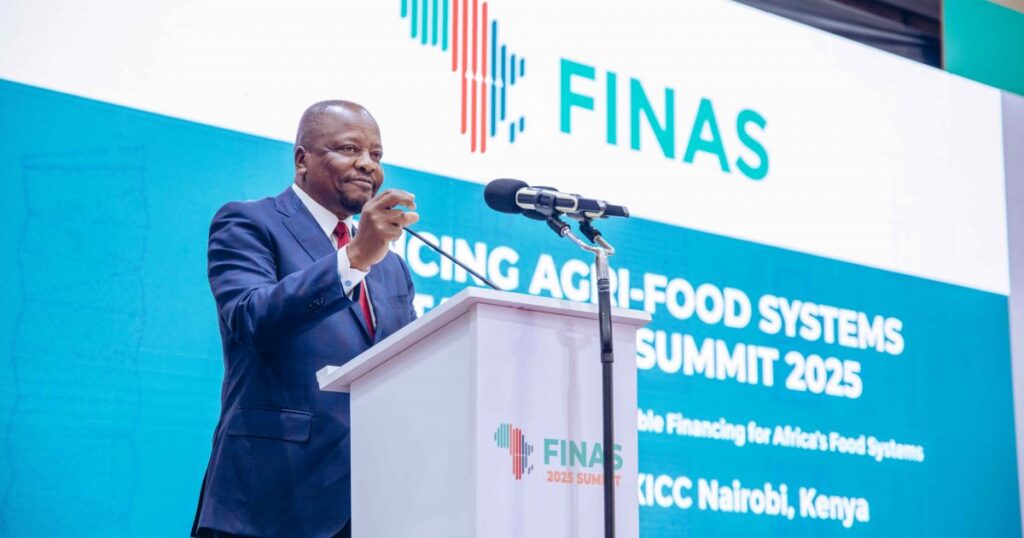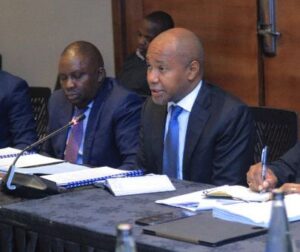
Agriculture CS Mutahi Kagwe speaking during FINAS-2025 summit. Photo | courtesy.
Agriculture Cabinet Secretary Mutahi Kagwe has called for urgent and sustained investment in Kenya’s agricultural sector, describing it as an economic imperative and a moral responsibility.
Speaking at the FINAS-2025 (Financing Agri-Foods Systems) Summit in Nairobi, CS Kagwe underscored agriculture’s critical role in ensuring food security, economic stability, and equitable development. He urged stakeholders, including financial institutions, policymakers, and the private sector, to “move beyond dialogue to action.”
“This is a critical moment, not just for dialogue but for action,” Kagwe said. “Financing food systems is not just an investment but a moral right.”
Underfunding and Inefficiencies
Despite agriculture contributing a significant portion to Kenya’s Gross Domestic Product (GDP), CS Kagwe lamented that the sector remains heavily underfunded. Currently, only 3 percent of Kenya’s national budget is allocated to agriculture, far below the African Union’s recommended 10 percent.
“This is unacceptable,” Kagwe stated. “We must work with the National Treasury and Parliament to increase the sector’s allocation. But more than that, we must double down on priorities, enhance budget efficiency, and recalibrate funding mechanisms to meet farmers’ real needs.”
ALSO READ: Saccos Urged to Invest in Product Development to Remain Competitive
He proposed that 80 percent of the agriculture budget be directed to farmers and only 20 percent towards administrative costs, emphasizing the need for direct impact at the grassroots.
Rethinking Agricultural Financing
Kagwe also spotlighted the significant financing gap that continues to plague African farmers, especially smallholders. Despite the agriculture sector’s importance, only 3 percent of commercial bank loans in Kenya in 2023 were directed to agriculture out of a US$49 billion loan book.
“This is a sad indictment,” he said, citing factors such as perceived high risks, lack of collateral, and underdeveloped rural capital markets. He called on financial institutions to be more innovative and develop products that align with the realities of farming.
“Stop locking farmers into short-term, high-interest loans. Lend at single-digit interest rates. Take a long-term view and encourage adoption of technology and contract farming,” he urged.
He also proposed reinstating a previously abandoned rule requiring financial institutions to allocate a percentage of their assets to agricultural lending.
Support for Smallholder Farmers
The CS highlighted the critical role of smallholder farmers in sustaining Kenya’s food systems. He called for tailored financial products that address their specific challenges and realities, especially those in rural and underserved regions.
“Financial institutions must create products that are accessible, affordable, and reflective of farming cycles. We must create a conducive environment for smallholder farmers to innovate and thrive,” he said.
Proposal for Agricultural Fund
To address the capital deficit, Kagwe proposed establishing a government-backed agricultural fund similar to the Constituencies Development Fund (CDF) and the Political Parties Fund. The fund would be managed through the Agricultural Finance Corporation (AFC), which he noted has a proven record but currently only services 25 percent of sector demand.
“By recapitalizing AFC and creating a dedicated fund from the exchequer, we will provide farmers with predictable, long-term financing options. This is the kind of structural change the sector needs,” he said.
Private Sector Involvement
Kagwe concluded by calling for a supportive environment for private sector investment in agriculture, noting that sustainable food systems require a collaborative effort.
“Let us work together to create a financing ecosystem that is inclusive, innovative, and sustainable. The future of our country depends on it,” he said.
The summit brought together a diverse range of stakeholders, including government officials, development partners, financial institutions, and farmer representatives, all echoing the call for deeper investment and reform in Kenya’s agriculture sector.






